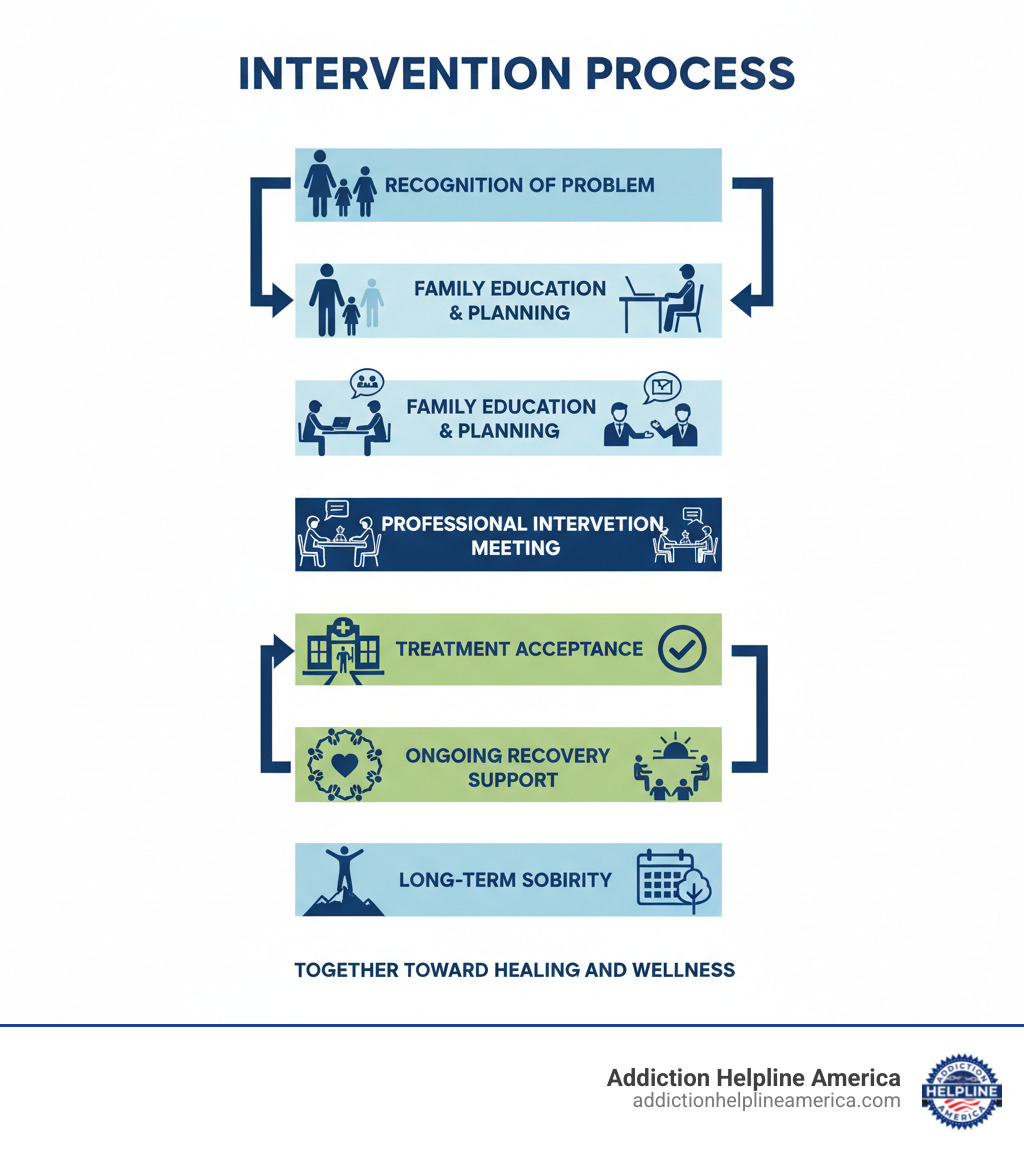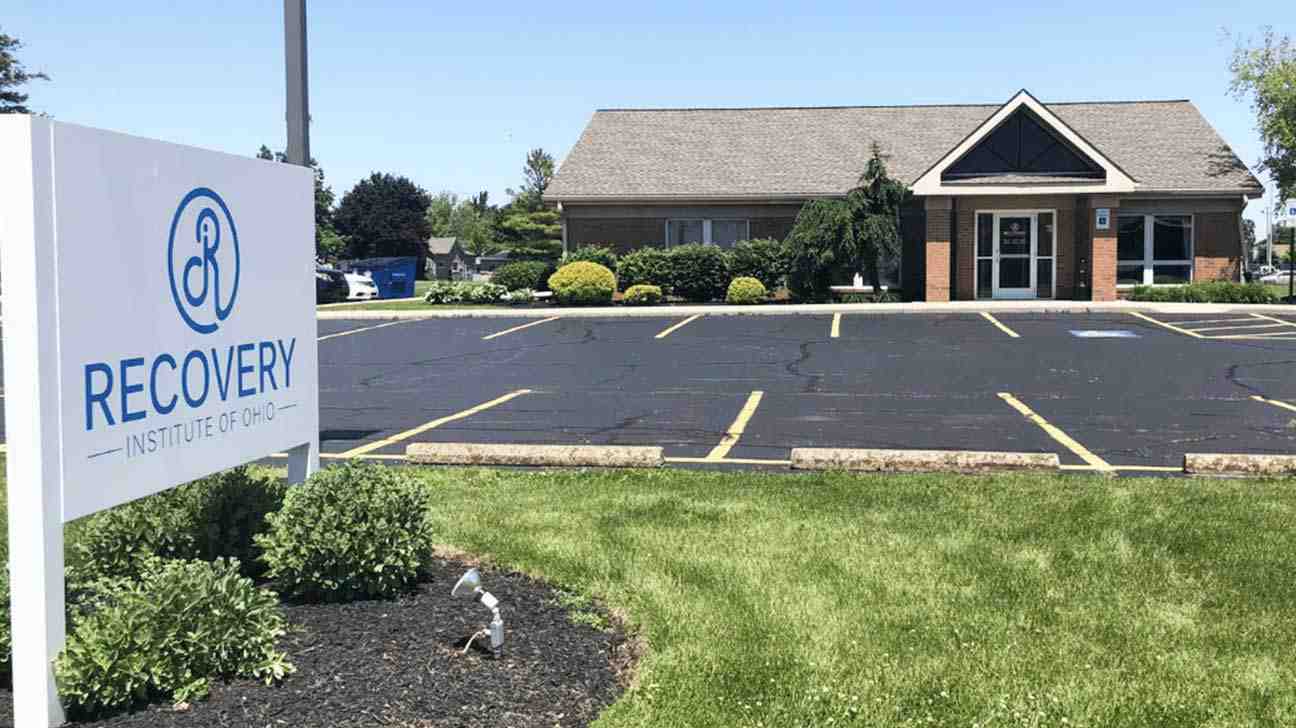
Understanding the First Step to Recovery
Drug intervention services are structured programs that help individuals struggling with substance use disorder recognize their problem and accept professional treatment. Here’s what you need to know:
What Drug Intervention Services Provide:
- Professional facilitation of conversations between family and addicted loved ones
- Education and guidance for families on effective communication strategies
- Treatment program recommendations and placement assistance
- Crisis management and emotional support during the intervention process
- Follow-up care coordination and family recovery coaching
When to Consider Intervention Services:
- Your loved one denies their substance use problem
- Previous attempts to help have failed
- The addiction is causing harm to health, relationships, or safety
- You feel overwhelmed and don’t know where to turn
The reality is that addiction develops slowly, making it hard for families to recognize when professional help becomes necessary. As one expert notes, “the most formidable challenge we professionals face is families not accepting our suggested solutions. Rather, they only hear us challenging theirs.”
The good news? Recovery is possible for everyone. Research shows that the majority of substance-dependent patients eventually stop compulsive use, especially when they remain in treatment for three months or longer. According to the National Institute on Drug Abuse (NIDA), treatment for addiction has similar success rates as treatment for other chronic medical conditions like diabetes or hypertension.
The need for these services has never been greater. In states like Arizona, drug-induced deaths now exceed those caused by auto accidents. Millions of Americans struggle with substance use disorders, and about half also experience serious mental illness.
At Addiction Helpline America, we’ve dedicated ourselves to connecting individuals and families with the right drug intervention services and treatment resources. Our experienced team of addiction specialists and recovery advocates provides 24/7 confidential support to help you take that crucial first step toward healing.

Drug intervention services terms to remember:
When and Why to Consider a Drug Intervention

Deciding when to intervene in a loved one’s struggle with substance use can feel overwhelming. Many families tell us they waited too long, hoping things would improve on their own. The truth is, drug intervention services exist precisely for those moments when someone can’t or won’t recognize they need help.
You might be wondering if it’s really “that bad” yet. You might worry about overreacting or damaging your relationship. These feelings are completely normal. But here’s what we’ve learned: the best time for an intervention is often earlier than families think.
Signs a Loved One Needs Help
Addiction has a way of hiding in plain sight. It develops gradually, making it hard to pinpoint exactly when things crossed the line from “experimentation” to “serious problem.” But there are patterns that emerge, warning signs that something has shifted.
Behavioral changes are often the first thing families notice. Your loved one might seem like a different person—more irritable, secretive, or prone to mood swings that feel out of character. They might lie about where they’ve been or who they’ve been with. Responsibilities at work, school, or home start slipping through the cracks. Personal hygiene might decline. Hobbies and activities they once enjoyed no longer seem to matter.
Physical signs can be harder to spot if you’re not sure what to look for. Unexplained weight changes—either dramatic loss or gain—are common. You might notice bloodshot eyes, dilated pupils, or tremors. They might get sick more often or complain of mysterious ailments. In some cases, you might find track marks or other physical evidence of drug use.
Social withdrawal is another red flag. They might pull away from family gatherings or stop returning calls from old friends. When they do socialize, it’s often with a new group of people who seem to encourage their substance use. They become defensive when asked simple questions about their day or activities.
Financial problems often accompany addiction. Money disappears without explanation. They borrow frequently and can’t pay it back. Valuables might go missing from your home. Bills go unpaid even though they claim to have money. The costs of maintaining an addiction add up quickly, and it shows.
Increased secrecy becomes a way of life. They guard their phone obsessively. They lock doors that used to stay open. They become evasive about their schedule or whereabouts. When questioned, they might lash out or turn the conversation around to make you feel like you’re the problem.
If you’re recognizing several of these signs, your instinct that something is wrong is probably right. Addiction is a chronic disease that changes how the brain works, making it incredibly difficult for someone to stop on their own, no matter how much they might want to.
The Role of a Professional Interventionist
You might be tempted to handle this yourself. After all, you know your loved one better than anyone, right? While that’s true, leading an intervention without professional help can backfire in ways you might not anticipate.
When emotions run high—and they will—it’s hard to stay calm and objective. You might say things in the heat of the moment that you’ll regret. Your loved one might feel attacked or ganged up on, causing them to shut down completely. Without training in crisis management, a well-intentioned conversation can quickly spiral into an argument that makes things worse.
This is where a professional interventionist becomes invaluable. They bring neutral facilitation to an emotionally charged situation. They’re not personally invested in the same way family members are, which allows them to guide the conversation without getting pulled into the drama. They keep everyone focused on the goal: getting your loved one into treatment.
Crisis management is a critical skill that interventionists develop through training and experience. If your loved one becomes angry, defensive, or emotionally volatile during the intervention, the interventionist knows how to de-escalate the situation. They can handle unexpected reactions and keep the process moving forward, even when things feel like they’re falling apart.
Family education is often the most valuable part of working with a professional. They’ll help you understand addiction as a disease, not a moral failing. They’ll identify enabling behaviors you might not realize you’re engaging in. They’ll teach you about healthy boundaries and codependency. They’ll prepare you for what to expect during the intervention and how to respond to different scenarios.
Treatment placement is where an interventionist’s network really shines. They know which programs specialize in which substances, which facilities handle co-occurring mental health issues, and which options fit different budgets. They can coordinate admission so that when your loved one agrees to treatment, they can go immediately—before they have time to change their mind.
Many interventionists also provide follow-up support after the intervention, helping families steer the early stages of their loved one’s recovery and adjust to new family dynamics. This ongoing guidance can make all the difference in maintaining progress.
For more detailed information about how these professionals work, you can explore drug intervention services in your area.
Different Intervention Approaches
Just as every person struggling with addiction is unique, there’s no single “right” way to conduct an intervention. Professional drug intervention services use different models based on the individual’s personality, family dynamics, and the severity of the addiction.
The direct approach, often called the Johnson Model, is probably what comes to mind when you think of an intervention. You’ve likely seen it portrayed on television: family and friends gather, often as a surprise, to confront their loved one with specific examples of how their substance use has caused harm. The message is clear and immediate: accept treatment now, or face predetermined consequences. This approach is carefully planned and rehearsed with a professional interventionist. It works well for people who are deep in denial and need a wake-up call, though it can feel confrontational.
The family-focused approach, such as the S.A.F.E.® (Self Awareness Family Education™) methodology, takes a different angle. It recognizes that addiction doesn’t just affect the person using substances—it impacts the entire family system. Instead of solely focusing on getting the loved one into treatment, this approach educates and supports the family in changing their own behaviors. The idea is that as family members stop enabling, set healthier boundaries, and take care of their own wellbeing, the loved one may naturally become more motivated to seek help. This approach includes ongoing family recovery coaching and works to create a healthier home environment, whether or not the loved one immediately accepts treatment. In states like Arizona, where addiction rates run higher than the national average, this family-centric approach has proven particularly valuable.
The positive reinforcement approach, particularly Community Reinforcement and Family Training (CRAFT), is evidence-based and designed specifically for families whose loved one refuses to acknowledge they have a problem. Rather than confrontation, CRAFT teaches families communication strategies that encourage healthy behaviors and discourage substance use through positive reinforcement. The goal is to help the loved one see the benefits of change on their own terms, making them more likely to seek treatment voluntarily. Research shows that CRAFT achieves treatment entry rates of about 65-75%—significantly higher than many traditional intervention methods. This isn’t a single intervention event but rather an ongoing strategy for the entire family.
| Intervention Model | Primary Focus | Key Characteristic | Role of Family | Outcomes if Treatment Refused |
|---|---|---|---|---|
| Direct Approach (Johnson Model) | Breaking through denial | Surprise confrontation with specific examples of harm | Present evidence and consequences in a structured meeting | Enforce predetermined consequences (e.g., no financial support, no contact) |
| Family-Focused (S.A.F.E.®) | Changing family dynamics | Education and coaching for the entire family system | Learn about enabling, codependency, and healthy boundaries | Continue family recovery work; loved one may seek help as family changes |
| Positive Reinforcement (CRAFT) | Motivating voluntary change | Teaching communication and reinforcement strategies | Practice new ways of interacting that encourage sobriety | Family maintains healthier patterns; door stays open for future treatment |
The right approach depends on your specific situation. A professional interventionist can help you determine which model is most likely to succeed with your loved one, taking into account their personality, the severity of their addiction, and your family’s unique circumstances.
Our helpline is 100%
free & confidential
If you or someone you care about is struggling with drug or alcohol addiction, we can help you explore your recovery options. Don’t face this challenge alone—seek support from us.
Programs
Resources
Will my insurance
cover addiction
treatment?
We're ready to help
Find the best
drug or alcohol treatment
center
Are you or a loved one struggling with addiction? Call today to speak to a treatment expert.












